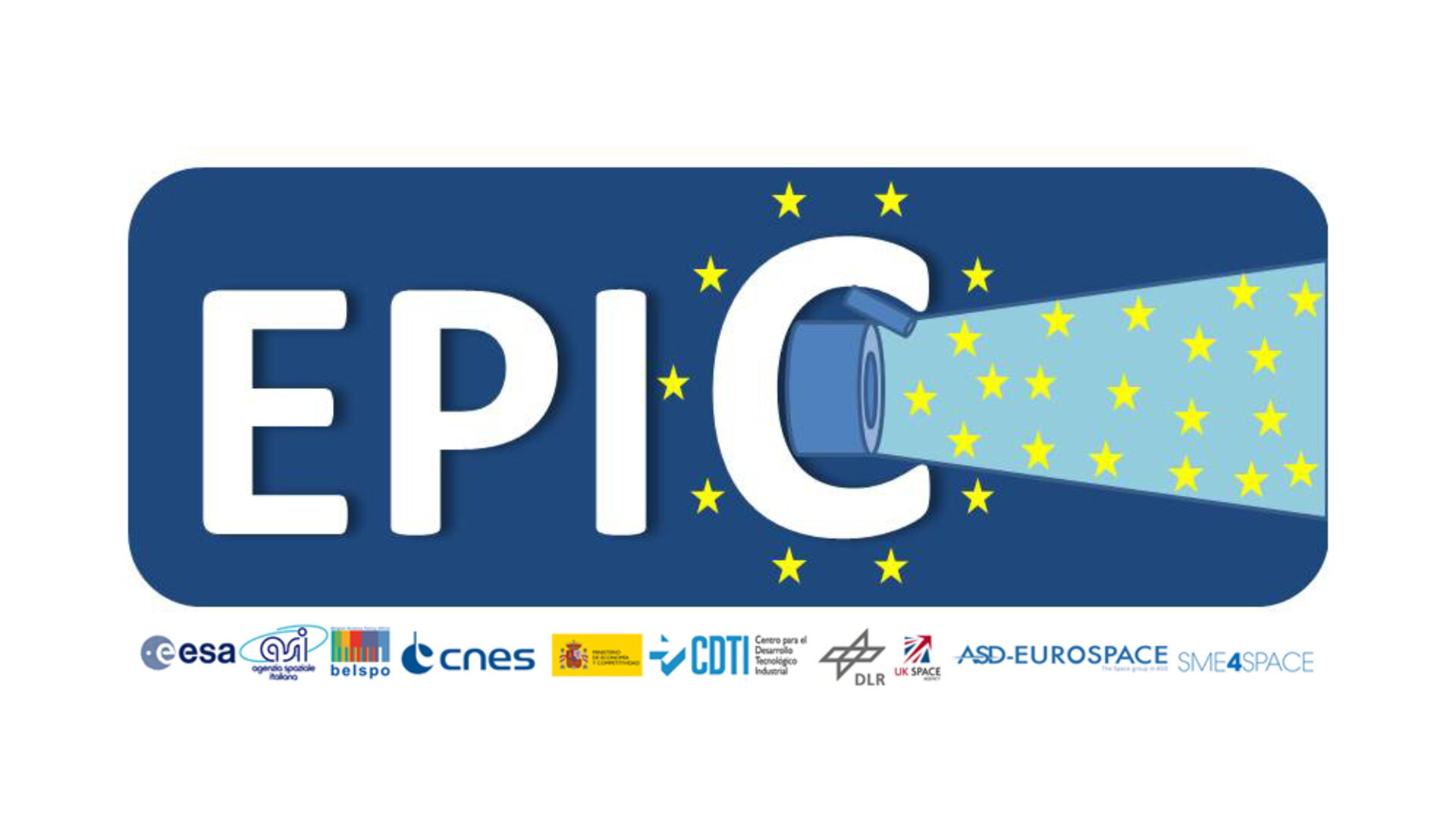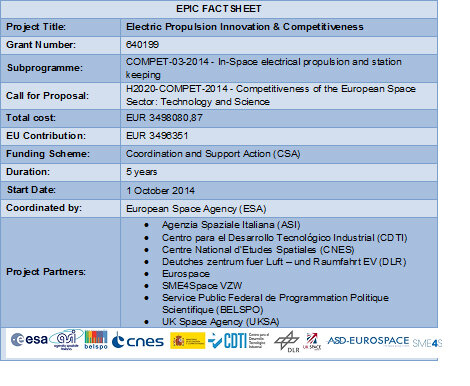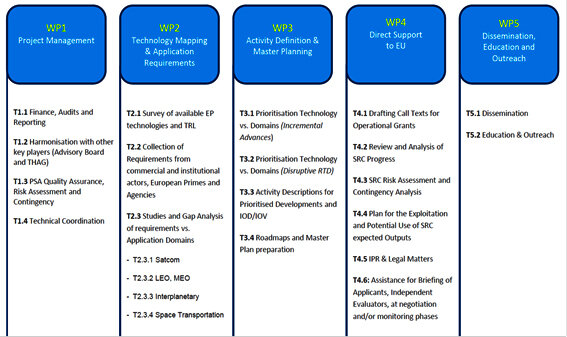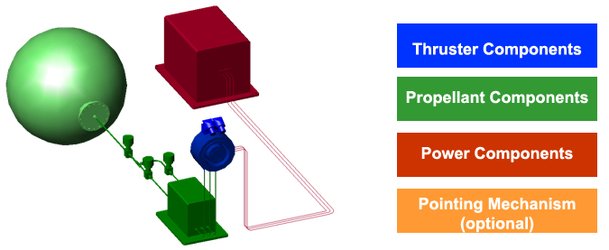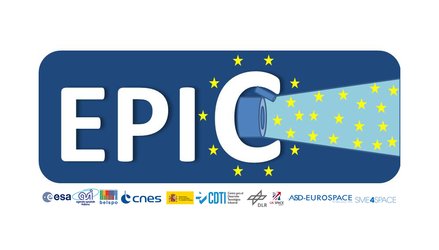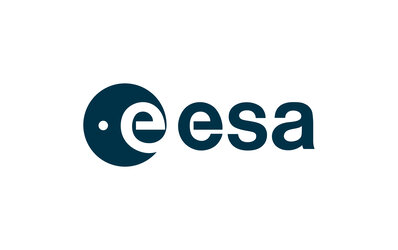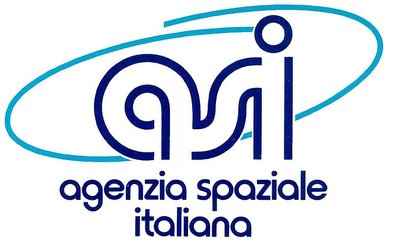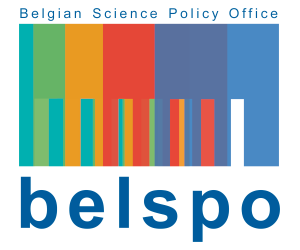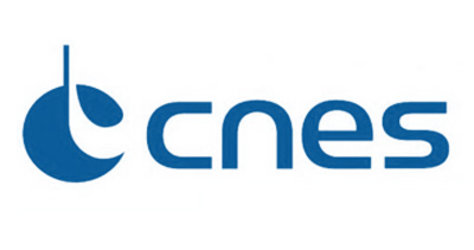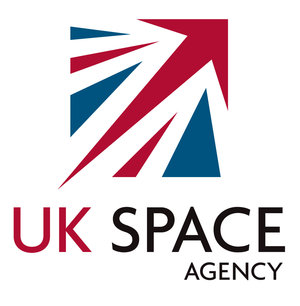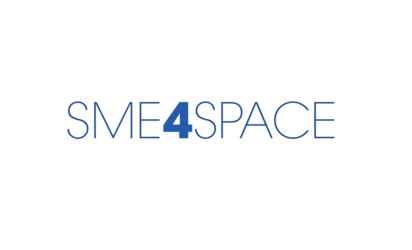EPIC: Electric Propulsion Innovation and Competitiveness
The European Commission has funded, as part of the Horizon 2020 Space Work Programme 2014, a Programme Support Activity (PSA) for the implementation of a Strategic Research Cluster (SRC) on “In-Space electrical propulsion and station keeping”.
The “Electric Propulsion Innovation & Competitiveness” (EPIC) is the PSA project for the Electric Propulsion cluster.
Electric propulsion has been identified by European actors as a Strategic Technology for improving the European competitiveness in different space areas such as in-space operations and transportation. The European Commission has set up the “In-space Electrical Propulsion and Station-Keeping” Strategic Research Cluster (SRC) in Horizon 2020 with the goal of enabling major advances in Electric Propulsion for in-space operations and transportation, in order to contribute to guarantee the leadership of European capabilities in electric propulsion at world level within the 2020-2030 timeframe, always in coherence with the existing and planned developments at national, commercial and ESA level.
The SRC set-up was initiated with the funding of a Programme Support Activity (PSA) for the cluster implementation, which has the mandate to, mainly, design the SRC, monitor its evolution and support the Commission on its implementation.
The “Electric Propulsion Innovation & Competitiveness” (EPIC) project is the PSA of the Electric Propulsion SRC, funded as response to the H2020 Space COMPET-3-2014 In-Space electrical propulsion and station keeping topic.
The Electric Propulsion Innovation & Competitiveness (EPIC) project aims, between others, to provide a clear integrated roadmap of activities and a master plan for its coordination and implementation through a Strategic Research Cluster (SRC) on “In-space Electrical Propulsion and Station-Keeping”.
The produced roadmap when implemented through the operational grants of the SRC and when correctly coordinated by the EPIC PSA, will contribute to substantially increase the Technology Readiness Level (TRL) of the related EP technologies.
EPIC has the role to provide advice and support to the European Commission on the calls for the SRC operational grants, including call texts, technical annexes and further work programme-related documentation, and to assess the evolution and results of those operational grants with respect to the overall SRC roadmap.
In order to fulfill its tasks and as stated in COMPET-3-2014, the PSA should deliver as a minimum, across its lifetime of 5 years, the following:
- the collection and consolidation of requirements for future EP thrusters from European satellite primes,
- the survey of available European (and non-European) EP technology and its TRL,
- the identification and definition of all the activities required to address the challenge of this topic,
- the draft text for the calls intended to fund the SRC operational grants
- the fully detailed master plan to coordinate all the activities for the whole duration of the SRC,
- the plan for the analysis and evaluation of the results during the execution of the activities within the SRC,
- a plan for the specific exploitation and potential use of the SRC expected outputs,
- and a risk assessment and contingency analysis for the SRC.
Relation between the Horizon 2020 Strategic Research Cluster (SRC) and the Programme Support Activity (PSA)
The Commission set up the main guidelines for the SRC as part of the open call for a PSA[1], mainly by mentioning that “SRCs will be implemented through a system of grants connected among them and consisting of:
- “Programme Support Activity” (PSA): The main role of this PSA is to elaborate a roadmap and implementation plan for the whole SRC (referred to hereafter as the SRC roadmap) and provide advice on the calls for operational grants. In 2014 interested consortia are invited to apply for one PSA grant for each of the identified SRCs: “In-space electrical propulsion and Station keeping” and “Space Robotics Technologies”. The PSA is also expected to contribute to the assessment of the evolution (and results) of operational grants.
- Operational grants: In future work programmes (2016 and beyond), and on the basis of this SRC roadmap and the PSA advice for the calls, the Commission is expected to publish calls for “operational grants”. The work programmes will determine whether they will be considered research and innovation grants (100%) or innovation grants (70%). The operational grants will address different technological challenges identified in the roadmap. The objective of this system of grants is that the expected results of each individual grant would, when taken together, achieve the overall objective of the SRC.
Each individual grant within the SRC (either the PSA or operational grants) will follow the general principles of H2020 in terms of proposals, evaluation, selection process and legal obligations. However, to ensure the effectiveness of the SRC’s operation overall, some specific provisions are necessary.”
[1] See in the right bar the “Strategic Research Clusters Guidelines” document
at http://ec.europa.eu/enterprise/policies/space/research/
EPIC Workload Distribution
EPIC proposes a Programme Support Activity to produce a clear integrated roadmap & master plan for its implementation through the Strategic Research Cluster (SRC) “In-space Electrical Propulsion & Station-Keeping”.
As part of Work Package (WP) 2, EPIC is tasked to do a survey of the current worldwide Electric Propulsion (and related) Technologies and their TRL (T2.1), as well as a collection of requirements from all stakeholders (including European primes), assessing potential future missions (T2.2). Both tasks build on the 2014 Electric Propulsion Technologies Harmonisation process, although the consultation should be enlarged to all EU actors by performing additional activities (e.g. survey, workshop)
This process allows to focus efforts on the SRC roadmap’ specific goals. Based on this work, a critical gap analysis of technologies and needs (T2.3) has to be done, to create the basis for selection of candidate SRC developments, oriented to satisfy both short to medium term (Incremental Advances Line) and medium to long term (Disruptive Line) needs.
The prioritization exercise (T3.1 and T3.2) will then be the driver and challenge, leading to the selection of priority activities for an SRC roadmap and a master plan (T3.4) for its implementation, aiming to contribute to the European leadership on EP technologies.
As part of WP4, EPIC is tasked to provide a solid advice to the Commission on the call texts for operational grants (T4.1) and continuous support to the Commission and REA to maximize the SRC success (T4.3). EPIC will analyze the SRC progress (T4.2), evaluate its risks & put a mitigation plan in place (T4.4), and will support the Commission on IPR and Legal Matters (T4.5), including the drafting of the SRC Collaboration Agreement which will establish the legal obligations and of all SRC projects parties with respect to one another, as well as ways of collaborating with one another.
The EPIC project has a Work Package dedicated to Dissemination of its progress and results, Education and Outreach (WP5), and intends to contribute to the SRC results’ dissemination not only with an exploitation plan but also by actively contributing to the coordination of the dissemination activities of all operational grants.


